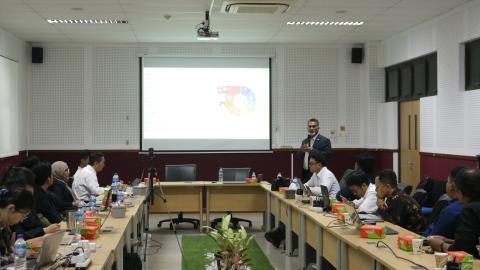You are here
Summer Course at UNY Graduate School: Shaping TVET to be Digital, Green, and Work-Ready

Graduate School of Universitas Negeri Yogyakarta (GS UNY) continues to strengthen its collaborative and globally oriented academic ecosystem. On Monday, September 22nd, 2025, GS UNY organized a Summer Course entitled “International Practice in TVET Development” at the Teleconference Room, 2nr floor of Sugeng Mardiyono Building, GS UNY, featuring Prof. Ts. Dr. Mohamad Sattar Rasul, M. Sc. Ind. Eng,, Chairman of the STEM Enculturation Research Center, Faculty of Education, Universiti Kebangsaan Malaysia (UKM), as the keynote speaker. The event highlighted the urgency of transforming Technical and Vocational Education and Training (TVET) to ensure graduates possess relevant technical and non-technical competencies, remain adaptive to technological change, and embrace sustainability.
In his presentation, Prof. Sattar underscored several important pillars, including industry-based curricula developed through campus–industry collaboration, internships, and partner laboratories. He also stressed the integration of digital skills such as artificial intelligence, big data, Internet of Things (IoT), and blended learning; the strengthening of soft skills and lifelong learning supported by micro-credentials; and the cultivation of green skills to advance the circular economy and energy transition. Furthermore, he emphasized the importance of public–private partnerships, Recognition of Prior Learning (RPL), data-driven decision-making through labor market analytics and tracer studies, and inclusivity to ensure equitable access to vocational education.
The discussion session was lively and interactive, with participants raising concerns about mismatches between campus and industry, the culture shock experienced by graduates, and the lack of work readiness in STEM fields. Responding to these issues, Prof. Sattar emphasized the need for curriculum approval from industries and professional bodies, the importance of lecturers regularly engaging in industry for upskilling, and the strengthening of career adaptability through real-world practice, internships, and close collaboration with businesses. Toward the end of the program, doctoral students from UNY and participants from UKM presented dissertation and article ideas and engaged in methodological discussions to explore potential joint research themes for the future.
The event concluded with a strong call for TVET to remain adaptive, innovative, inclusive, and sustainable. By adopting international best practices and building strong research networks, vocational institutions—particularly GS UNY—are expected to produce graduates who are ready to face global challenges and contribute meaningfully to sustainable development.

FAKULTAS DI UNY
- Fakultas Ilmu Pendidikan
- Fakultas Bahasa, Seni, dan Budaya
- Fakultas Matematika dan Ilmu Pengetahuan Alam
- Fakultas Ilmu Sosial dan Ilmu Politik
- Fakultas Teknik
- Fakultas Ilmu Keolahragaan dan Kesehatan
- Fakultas Ekonomi dan Bisnis
- Fakultas Vokasi
- Fakultas Psikologi
- Fakultas Hukum
- Fakultas Kedokteran
- Sekolah Pascasarjana
SEKOLAH PASCASARJANA UNY
Kampus Karangmalang, Yogyakarta 55281
Telp. +62274-550836 (front office)
Fax. +62274-520326 Email: pps@uny.ac.id, humas_pps@uny.ac.id
Website : http://sps.uny.ac.id
Copyright © 2026,


